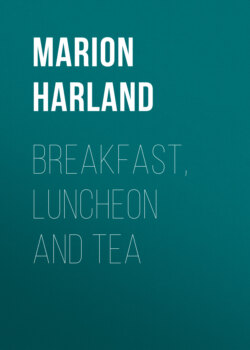Читать книгу Breakfast, Luncheon and Tea - Marion Harland - Страница 82
На сайте Литреса книга снята с продажи.
CROQUETTES.
————————
ОглавлениеTable of Contents
These popular little roulettes, although comparatively new to the tables of most private families in America, hold their place well where they have been once introduced. Like the paté, their name is Legion as regards shape, nature and quality.
In a housewifely conversation with a lady a few months since, the word “croquette” chanced to escape me, and I was caught up eagerly.
“Now,” with an ingenuous blush, “do you know, I was offered some at a dinner-party the other day, and was completely nonplussed! I thought croquet was a game.”
“Croquette!” I interposed, making the most of the final t, and e.
“The gentleman who sat next me said ‘croquay,’ very plainly, I assure you. But never mind the name. What are they made of? Hominy?”
“Yes,” returned I. “Or rice, or potato, or lobster, crab, salmon, halibut, cod, chicken, turkey, duck, game, veal, lamb, or beef. In short, of all kinds of fish, flesh, fowl, and vegetable. The smaller varieties are familiarly known to readers of cookery-books as ‘olives’ of meat, poultry, or game; the larger as rissoles or croquettes, the largest as cannelons or mirotons.”
“Good gracious!” uttered my overwhelmed friend. “Before I would bother my brain with such puzzling nonsense, I would set my family down to cold meat three times a day three days in a week!”
I believed she meant what she said. But not the less is it a “good” and a “gracious” thing for the housewife to conjure out of such unconsidered and unsightly trifles as the mutilated cold fowl from which half the breast and both legs are missing, or the few chops “left over,” or “that bone” of lamb or veal, or three square inches of cold fish, a pretty plat for breakfast or luncheon, of golden-brown croquettes, imbedded in parsley, or in a ruby setting of pickled beets, that shall quicken John’s flagging appetite, and call from the little ones the never stale plaudit, “Mamma can always get up something nice.”
“Gather up the fragments that remain, that nothing be lost,” is a text from which the thoughtful house-mother may preach to herself, as well as to her servants. That no opportunity of making home fairer, and even one hour of the day a little brighter, be lost or overlooked. That no possibility of proving her constant, active love for the least of her flock be passed by. These daily cares and hourly assiduities are the rivets in the chain that binds her best beloved ones unto The Family. Lacking them, the relation, instituted by law and continued by custom, has no stancher securities than habit and convenience—a hay-rope that will shrivel at the first touch of Passion, be rent by one resolute wrench of Expediency.
“A serious view to take of croquettes?” do I hear you say. Then hearken to something positive and practical.
Unpalatable food is not wholesome. It may be medicinal. Nothing forced upon an unwilling appetite, and that does not gratify the palate, can impart that freshness of animal spirit and vigor which we call Life—spontaneous vitality. Indifferent fuel—green or sodden wood, or slaty coal—may keep a fire from going out. There is not begotten from these the leaping flame that gladdens, while it warms. And cold meat and bread, dried into sawdusty innutrition, should no more form the staple of John’s meals, even three times a week, than his grate be filled, on December nights, with coke-dust and mica.
